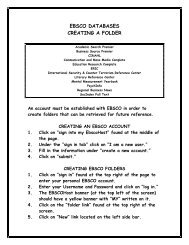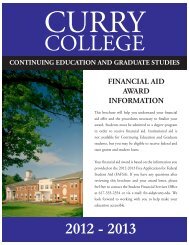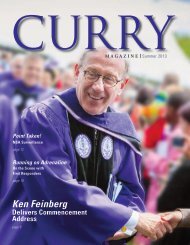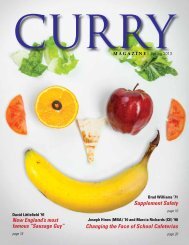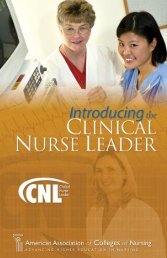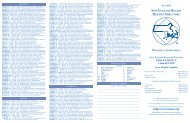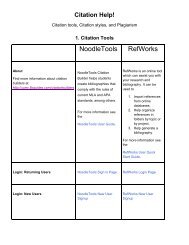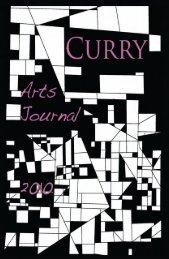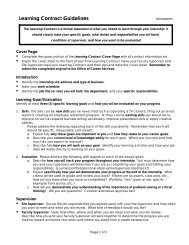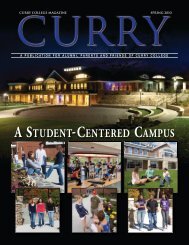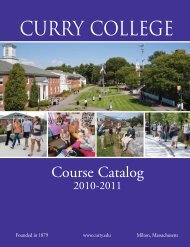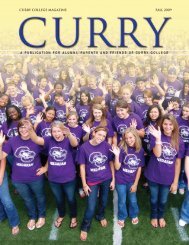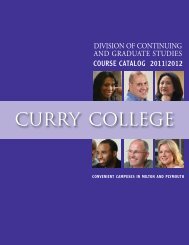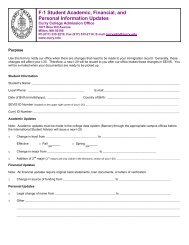Read the Curry College NEASC 2012 Self-Study Report.
Read the Curry College NEASC 2012 Self-Study Report.
Read the Curry College NEASC 2012 Self-Study Report.
You also want an ePaper? Increase the reach of your titles
YUMPU automatically turns print PDFs into web optimized ePapers that Google loves.
38<br />
with enhanced online support for homework and strategy instruction, trained all fulland<br />
part‐time faculty in <strong>the</strong> new format, and will be offering <strong>the</strong> redesigned sequence in<br />
2011‐12.<br />
• PAL: Initial learning outcomes assessment studied student metacognition through<br />
indirect methods in 2009‐10, and subsequent course‐level learning outcomes and<br />
methods of instruction were assessed in 2010‐11 (e.g., inventory of syllabi followed by<br />
program‐wide recommendations by <strong>the</strong> faculty).<br />
• Information Literacy: Pilot work with Project TRAILS (Tools for Real‐time Assessment of<br />
Information Literacy Skills, a free, online instrument), 12th Grade Level, revealed<br />
enhanced effectiveness of student learning through library instruction when specific<br />
assignments were integrated with content‐specific course material. lxxxviii Expanded<br />
assessments were next implemented in Fall 2011 using college‐level Project SAILS<br />
(Standardized Assessment of Information Literacy Skills, a fee‐based on‐line instrument<br />
supported by <strong>the</strong> <strong>College</strong>) in Applied Computing 1000, a required first‐year technology<br />
literacy course, to better understand information literacy gains in <strong>the</strong> first year. lxxxix<br />
While <strong>the</strong> above documented gains in academic program learning outcomes assessment<br />
represent progress, a priority in <strong>the</strong> Projection section is to ensure that every academic<br />
program regularly assesses what and how students are learning and incorporates that<br />
information into curricular, pedagogical, and o<strong>the</strong>r planning. In addition to supporting all<br />
academic programs to advance toward <strong>the</strong>se goals, <strong>the</strong> LOAC has a significant role to play in<br />
advocating and advancing priority pilot initiatives that take a broad view of institutional<br />
progress. New pilots and initiatives informed by evaluation of assessment progress are<br />
expected to be fur<strong>the</strong>red through <strong>the</strong> proactive work of <strong>the</strong> committee in recommending<br />
projects that increase <strong>the</strong> iterative use and assessment of learning outcomes in both curricular<br />
and co‐curricular areas.<br />
In supporting such developments within <strong>the</strong> academic domain, some important gains have<br />
already been achieved, and insights have emerged that have created consensus about <strong>the</strong> need<br />
for action. In <strong>the</strong> case of introductory statistics, for example, prioritization of learning outcomes<br />
assessment—reported to be a source of frustration for full‐time, part‐time, and crossdisciplinary<br />
faculty—paved <strong>the</strong> way for widespread adoption of a new curriculum and a high<br />
degree of participation in faculty development and training. This progress has informed <strong>the</strong><br />
efforts of a new interdisciplinary “Curriculum Innovation Community” (a faculty learning<br />
community focused on curriculum support for Quantitative Literacy), thus impacting program<br />
development and resource requirements beyond <strong>the</strong> individual program.<br />
In <strong>the</strong> student life and co‐curricular domain, <strong>the</strong> <strong>College</strong> has also built learning outcomes<br />
assessment, both direct and indirect, into a wide range of programs and services. The process<br />
of bringing toge<strong>the</strong>r faculty and staff from academic and student affairs in <strong>the</strong> same workshops<br />
series (Spring 2011) led to an enhanced understanding of common purposes and challenges in<br />
supporting student learning. For example, commonalities and intersecting priorities were<br />
identified in: learning outcomes in curricular internship instruction and student organization<br />
leadership; learning outcomes assessment for peer tutors and student employees; and <strong>the</strong><br />
<strong>Curry</strong> <strong>College</strong> <strong>2012</strong> <strong>Self</strong>-<strong>Study</strong><br />
Standard Four



